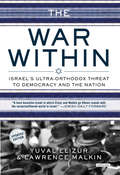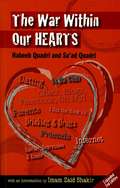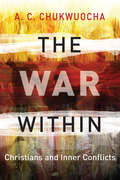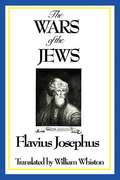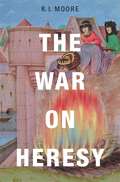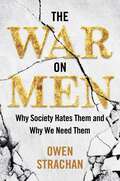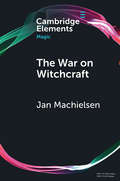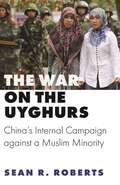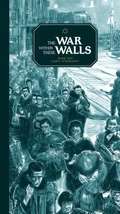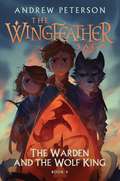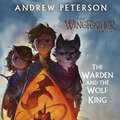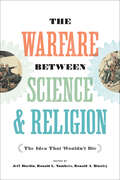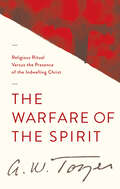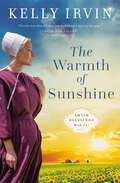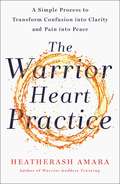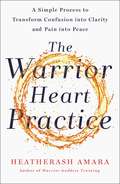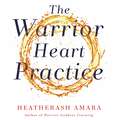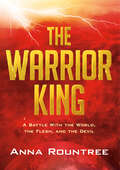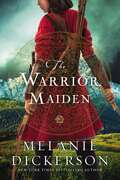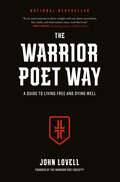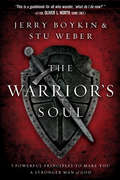- Table View
- List View
The War Within
by Yuval ElizurIn recent years there has been a war raging within Israel -- but not the interminable conflict between the Israelis and Palestinians, as one might assume. For many Israelis, it is the internecine conflict with the ultra-orthodox Haredim that impacts their lives the most. The majority of Haredim -- raised with an intense focus on religion at the expense of all else -- are unemployable in a modern economy. Many choose to pursue religious studies, which the government subsidizes up to the age of 40. The first book on a conflict that is fast crystallizing into a national debate, The War Within is a lively and trenchant exploration of a battle between church and state as it plays out before our eyes in Israel today. As acclaimed journalists Yuval Elizur and Lawrence Malkin expose, the situation today has reached a critical point that threatens the state of Israel from within and must certainly affect its future.
The War Within Our Hearts
by Imam Zaid Shakir Habeeb Quadri Sa'Ad Quadri"An insightful volume that takes on many of the issues confronting Muslim youth in the West, sometimes with humor, oftentimes with brutal frankness, but always with sound knowledge and great clarity."- Imam Zaid Shakir, Zaytuna Institute, CaliforniaThis is not just another book about Muslim youth. It is a book by young Muslims for young Muslims, addressing issues such as media, music, dating, and drugs in a language that is their own. With an introduction by Imam Zaid Shakir.
The War Within: Christians and Inner Conflicts
by Revd. Canon A. C. ChukwuochaThose who long to walk close to God are often keenly aware of their shortcomings. This was as true for the apostles as it is for today’s Christian leaders and Christian students. In this book, the author sets out to answer the following questions: • What lies behind these inner conflicts? • What are the implications of such conflicts for Christians? • How does one successfully handle these conflicts? • How useful is a rational mind to the Holy Spirit? This book offers deep spiritual insights interlaced with down-to-earth illustrations that make it easily accessible and relevant.
The War Within: Israel's Ultra-Orthodox
by Lawrence Malkin Yuval ElizurIn recent years there has been a war raging within Israel -- but not the interminable conflict between the Israelis and Palestinians, as one might assume. For many Israelis, it is the internecine conflict with the ultra-orthodox Haredim that impacts their lives the most. The majority of Haredim -- raised with an intense focus on religion at the expense of all else -- are unemployable in a modern economy. Many choose to pursue religious studies, which the government subsidizes up to the age of 40. The first book on a conflict that is fast crystallizing into a national debate, The War Within is a lively and trenchant exploration of a battle between church and state as it plays out before our eyes in Israel today. As acclaimed journalists Yuval Elizur and Lawrence Malkin expose, the situation today has reached a critical point that threatens the state of Israel from within and must certainly affect its future.
The War Within: Israel's Ultra-Orthodox
by Lawrence Malkin Yuval ElizurIn recent years there has been a war raging within Israel -- but not the interminable conflict between the Israelis and Palestinians, as one might assume. For many Israelis, it is the internecine conflict with the ultra-orthodox Haredim that impacts their lives the most. The majority of Haredim -- raised with an intense focus on religion at the expense of all else -- are unemployable in a modern economy. Many choose to pursue religious studies, which the government subsidizes up to the age of 40. The first book on a conflict that is fast crystallizing into a national debate, The War Within is a lively and trenchant exploration of a battle between church and state as it plays out before our eyes in Israel today. As acclaimed journalists Yuval Elizur and Lawrence Malkin expose, the situation today has reached a critical point that threatens the state of Israel from within and must certainly affect its future.
The War of the Jews
by Flavius JosephusIn The Wars of the Jews Flavius Josephus gives us valuable insight into the first Jewish Roman War and the rebellions that followed thereafter. Josephus having been an agent for both sides of the conflict provides us with a perspective of this conflict that no one else could have. Here is an important historical document.
The War on Heresy
by R. I. MooreBetween 1000 and 1250, the Catholic Church confronted the threat of heresy with increasing force. Some of the most portentous events in medieval history-the Cathar crusade, the persecution and mass burnings of heretics, the papal inquisition established to identify and suppress beliefs that departed from the true religion-date from this period. Fear of heresy molded European society for the rest of the Middle Ages and beyond, and violent persecutions of the accused left an indelible mark. Yet, as R. I. Moore suggests, the version of these events that has come down to us may be more propaganda than historical reality. Popular accounts of heretical events, most notably the Cathar crusade, are derived from thirteenth-century inquisitors who saw organized heretical movements as a threat to society. Skeptical of the reliability of their reports, Moore reaches back to earlier contemporaneous sources, where he learns a startling truth: no coherent opposition to Catholicism, outside the Church itself, existed. The Cathars turn out to be a mythical construction, and religious difference does not explain the origins of battles against heretic practices and beliefs. A truer explanation lies in conflicts among elites-both secular and religious-who used the specter of heresy to extend their political and cultural authority and silence opposition. By focusing on the motives, anxieties, and interests of those who waged war on heresy, Moore’s narrative reveals that early heretics may have died for their faith, but it was not because of their faith that they were put to death.
The War on Men: Why Society Hates Them and Why We Need Them
by Owen StrachanMen—and masculinity in general—are under attack. For society to succeed, we need strong men to lead us in all areas of life.
The War on Witchcraft: Andrew Dickson White, George Lincoln Burr, and the Origins of Witchcraft Historiography (Elements in Magic)
by Jan MachielsenHistorians of the early modern witch-hunt often begin histories of their field with the theories propounded by Margaret Murray and Montague Summers in the 1920s. They overlook the lasting impact of nineteenth-century scholarship, in particular the contributions by two American historians, Andrew Dickson White (1832–1918) and George Lincoln Burr (1857–1938). Study of their work and scholarly personae contributes to our understanding of the deeply embedded popular understanding of the witch-hunt as representing an irrational past in opposition to an enlightened present. Yet the men's relationship with each other, and with witchcraft sceptics – the heroes of their studies – also demonstrates how their writings were part of a larger war against 'unreason'. This Element thus lays bare the ways scholarly masculinity helped shape witchcraft historiography, a field of study often seen as dominated by feminist scholarship. Such meditation on past practice may foster reflection on contemporary models of history writing.
The War on the Uyghurs: China's Internal Campaign against a Muslim Minority (Princeton Studies in Muslim Politics #78)
by Sean R. RobertsHow China is using the US-led war on terror to erase the cultural identity of its Muslim minority in the Xinjiang regionWithin weeks of the September 11 attacks on New York and Washington, the Chinese government warned that it faced a serious terrorist threat from its Uyghur ethnic minority, who are largely Muslim. In this explosive book, Sean Roberts reveals how China has been using the US-led global war on terror as international cover for its increasingly brutal suppression of the Uyghurs, and how the war's targeting of an undefined enemy has emboldened states around the globe to persecute ethnic minorities and severely repress domestic opposition in the name of combatting terrorism.Of the eleven million Uyghurs living in China today, more than one million are now being held in so-called reeducation camps, victims of what has become the largest program of mass detention and surveillance in the world. Roberts describes how the Chinese government successfully implicated the Uyghurs in the global terror war—despite a complete lack of evidence—and branded them as a dangerous terrorist threat with links to al-Qaeda. He argues that the reframing of Uyghur domestic dissent as international terrorism provided justification and inspiration for a systematic campaign to erase Uyghur identity, and that a nominal Uyghur militant threat only emerged after more than a decade of Chinese suppression in the name of counterterrorism—which has served to justify further state repression.A gripping and moving account of the humanitarian catastrophe that China does not want you to know about, The War on the Uyghurs draws on Roberts's own in-depth interviews with the Uyghurs, enabling their voices to be heard.
The War within these Walls
by Aline SaxIt's World War II, and Misha's family, like the rest of the Jews living in Warsaw, has been moved by the Nazis into a single crowded ghetto. Conditions are appalling: every day more people die from disease, starvation, and deportations. Misha does his best to help his family survive, even crawling through the sewers to smuggle food. When conditions worsen, Misha joins a handful of other Jews who decide to make a final, desperate stand against the Nazis.
The Warden and the Wolf King: (Wingfeather Series 4) (Wingfeather series #4)
by Andrew PetersonAll winter long, people in the Green Hollows have prepared for a final battle with Gnag the Nameless and the Fangs of Dang. Janner, Kalmar, and Leeli are ready and willing to fight alongside the Hollowsfolk. But when the Fangs make the first move and invade Ban Rona, the children are separated. Janner is alone and lost in the hills; Leeli is fighting the Fangs from the rooftops of the city; and Kalmar, who carries a terrible secret, is on a course for the Deeps of Throg. Monsters and Fangs and villains lie between the children and their only hope of victory in the epic conclusion of The Wingfeather Saga.
The Warden and the Wolf King: (Wingfeather Series 4) (Wingfeather series #4)
by Andrew PetersonOur intrepid heroes are caught in the middle of an epic showdown between good and evil in the fourth and final novel of the Wingfeather Saga, narrated by the author. All winter long, people in the Green Hollows have prepared for a final battle with Gnag the Nameless and the Fangs of Dang. Janner, Kalmar, and Leeli are ready and willing to fight alongside the Hollowsfolk. But when the Fangs make the first move and invade Ban Rona, the children are separated. Janner is alone and lost in the hills; Leeli is fighting the Fangs from the rooftops of the city; and Kalmar, who carries a terrible secret, is on a course for the Deeps of Throg. Monsters and Fangs and villains lie between the children and their only hope of victory in the epic conclusion of The Wingfeather Saga.(P)2021 Penguin Random House Audio
The Warfare between Science & Religion: The Idea That Wouldn't Die
by Edited by Jeff Hardin, Ronald L. Numbers, and Ronald A. BinzleyA “very welcome volume” of essays questioning the presumption of irreconcilable conflict between science and religion (British Journal for the History of Science).The “conflict thesis”—the idea that an inevitable, irreconcilable conflict exists between science and religion—has long been part of the popular imagination. The Warfare between Science and Religion assembles a group of distinguished historians who explore the origin of the thesis, its reception, the responses it drew from various faith traditions, and its continued prominence in public discourse.Several essays examine the personal circumstances and theological idiosyncrasies of important intellectuals, including John William Draper and Andrew Dickson White, who through their polemical writings championed the conflict thesis relentlessly. Others consider what the thesis meant to different religious communities, including evangelicals, liberal Protestants, Roman Catholics, Eastern Orthodox Christians, Jews, and Muslims. Finally, essays both historical and sociological explore the place of the conflict thesis in popular culture and intellectual discourse today.Based on original research and written in an accessible style, the essays in The Warfare between Science and Religion take an interdisciplinary approach to question the historical relationship between science and religion, and bring much-needed perspective to an often-bitter controversy.Contributors include: Thomas H. Aechtner, Ronald A. Binzley, John Hedley Brooke, Elaine Howard Ecklund, Noah Efron, John H. Evans, Maurice A. Finocchiaro, Frederick Gregory, Bradley J. Gundlach, Monte Harrell Hampton, Jeff Hardin, Peter Harrison, Bernard Lightman, David N. Livingstone, David Mislin, Efthymios Nicolaidis, Mark A. Noll, Ronald L. Numbers, Lawrence M. Principe, Jon H. Roberts, Christopher P. Scheitle, M. Alper Yalçinkaya
The Warfare between Science and Religion: The Idea That Wouldn't Die
by Edited by Jeff Hardin, Ronald L. Numbers, and Ronald A. BinzleyWhy is the idea of conflict between science and religion so popular in the public imagination?The "conflict thesis"—the idea that an inevitable and irreconcilable conflict exists between science and religion—has long been part of the popular imagination. In The Warfare between Science and Religion, Jeff Hardin, Ronald L. Numbers, and Ronald A. Binzley have assembled a group of distinguished historians who explore the origin of the thesis, its reception, the responses it drew from various faith traditions, and its continued prominence in public discourse. Several essays in the book examine the personal circumstances and theological idiosyncrasies of important intellectuals, including John William Draper and Andrew Dickson White, who through their polemical writings championed the conflict thesis relentlessly. Other essays consider what the thesis meant to different religious communities, including evangelicals, liberal Protestants, Roman Catholics, Eastern Orthodox Christians, Jews, and Muslims. Finally, essays both historical and sociological explore the place of the conflict thesis in popular culture and intellectual discourse today. Based on original research and written in an accessible style, the essays in The Warfare between Science and Religion take an interdisciplinary approach to question the historical relationship between science and religion. This volume, which brings much-needed perspective to an often bitter controversy, will appeal to scholars and students of the histories of science and religion, sociology, and philosophy.Contributors: Thomas H. Aechtner, Ronald A. Binzley, John Hedley Brooke, Elaine Howard Ecklund, Noah Efron, John H. Evans, Maurice A. Finocchiaro, Frederick Gregory, Bradley J. Gundlach, Monte Harrell Hampton, Jeff Hardin, Peter Harrison, Bernard Lightman, David N. Livingstone, David Mislin, Efthymios Nicolaidis, Mark A. Noll, Ronald L. Numbers, Lawrence M. Principe, Jon H. Roberts, Christopher P. Scheitle, M. Alper Yalçinkaya
The Warfare of the Spirit: Religious Ritual Versus the Presence of the Indwelling Christ
by A. W. TozerThe life of a Christian is packed full of conflict. The Warfare of the Spirit discusses the persistent struggle against the evil forces of the world, the flesh, and even the deceiving ways of Satan. Breaking down the spiritual warfare that is going on all around us, in both the physical and spiritual realms, Tozer examines many aspects of the human experience that can potentially damage us spiritually—like concerns about money, social status, conflict with others, or even confusing the meaning Christmas. Tozer also unapologetically states the dangers of adhering to a theology that absolves the unbeliever of any punishment. For if there is no hell, he warns, there is no heaven either. Beginning this book with a triumphant call to battle, A. W. Tozer inspires the believer to seek and destroy the evil forces working in this world. This book empowers its reader to eradicate complacency and sloth and live actively for the Lord every day.
The Warfare of the Spirit: Religious Ritual Versus the Presence of the Indwelling Christ
by A. W. TozerThe life of a Christian is packed full of conflict. The Warfare of the Spirit discusses the persistent struggle against the evil forces of the world, the flesh, and even the deceiving ways of Satan. Breaking down the spiritual warfare that is going on all around us, in both the physical and spiritual realms, Tozer examines many aspects of the human experience that can potentially damage us spiritually—like concerns about money, social status, conflict with others, or even confusing the meaning Christmas. Tozer also unapologetically states the dangers of adhering to a theology that absolves the unbeliever of any punishment. For if there is no hell, he warns, there is no heaven either. Beginning this book with a triumphant call to battle, A. W. Tozer inspires the believer to seek and destroy the evil forces working in this world. This book empowers its reader to eradicate complacency and sloth and live actively for the Lord every day.
The Warmth of Sunshine (Amish Blessings #2)
by Kelly IrvinAbigail&’s Amish life has always followed a certain path . . . until an Englisch woman disrupts all she&’s known to be true.Growing up Amish, Abigail Bontrager often felt like a square peg in a round hole. Her pie crusts always turned out tough. Her stitches always ran crooked. She was clumsy. Not ideal for an aspiring Amish wife and mother, but her faith and love of her family, which are so much more important, are solid. Plus, her relationship with the attractive and kindhearted Owen Kurtz is moving in the right direction.Owen is part dreamer, part entrepreneur. His friendship with Abigail has gradually blossomed into a sweet and loving courtship. Inspired by the hope of a future with the girl of his dreams, he decides to take the next step in building a business of his own—in the promising new industry of growing sunflowers.When an outsider claiming to be Abigail&’s birth mother abruptly enters her life, Abigail&’s world comes crashing down. Confused and upset, she is determined to discover who she really is. Her journey of discovery leads to the possibilities of a new life waiting for her in the Englisch world. But is this new life really worth giving up everything and everyone she&’s known? How can Abigail and Owen follow their hearts—and God&’s plan—when these new paths now lead them into the unknown?In this second book in the Amish Blessings series, bestselling and award-winning romance novelist Kelly Irvin shares an inspiring story of following your heart while trusting God to lead you into your future.Praise for The Warmth of Sunshine:&“Just like the title, The Warmth of Sunshine is a lovely and cozy story that will keep you reading until the very last page.&” —Kathleen Fuller, USA Today bestselling author of The Mail-Order Amish Brides seriesSweet and thoughtful Amish romanceSecond in the Amish Blessings series, but can be read in any order:Book 1: Love&’s DwellingBook 2: The Warmth of SunshineBook 3: Every Good Gift (Available February 2023)Book length: 102,000 wordsIncludes discussion questions for book clubs
The Warrior Heart Practice: A Simple Process to Transform Confusion into Clarity and Pain into Peace
by HeatherAsh AmaraA revolutionary process based on the four chambers of the heart and rooted in Toltec wisdom that brings emotional clarity, healing, and freedomThe Warrior Heart Practice is a powerful new method to reconnect with our sense of authenticity and inner-knowing and realign with our true nature. Author of the bestselling book Warrior Goddess Training, HeatherAsh Amara has trained extensively in the Toltec tradition under the tutelage of don Miguel Ruiz, author of The Four Agreements. The Warrior Heart Practice is a revolutionary system based on the four chambered structure of the human heart. Walking through each of the four chambers—Feeling, Story, Truth, and Intent—readers learn to take stock of their current emotional and mental state and reframe their situation in a new healing light. The process begins in the Feeling chamber as readers accept the emotions they are currently experiencing without fighting or judging them. It then continues into the next chamber as readers witness the Story that they are telling themselves. In the Truth chamber, they learn to thoughtfully and objectively evaluate the reality of the situation. In the final chamber, they learn to define and focus their Intent. The last phase of the practice is the most profound—taking the knowledge they have gathered from the four chambers, readers then walk backwards through each of the four chambers, refocusing their Intent, Truth, Story, and Feelings based on what they’ve learned during the process. The Warrior Heart Practice leads to deep insights as readers learn to step outside of their preconceptions to realign with their true purposes and goals.
The Warrior Heart Practice: A simple process to transform confusion into clarity and pain into peace
by HeatherAsh AmaraA revolutionary process based on the four chambers of the heart and rooted in Toltec wisdom that brings emotional clarity, healing and freedom.The Warrior Heart Practice is a powerful new method to reconnect with our sense of authenticity and inner-knowing and realign with our true nature. Author of the bestselling book Warrior Goddess Training, HeatherAsh Amara has trained extensively in the Toltec tradition under the tutelage of don Miguel Ruiz, author of The Four Agreements.The Warrior Heart Practice is a revolutionary system based on the four chambered structure of the human heart. The Warrior Heart Practice leads to deep insights as readers learn to step outside of their preconceptions to realign with their true purposes and goals.'Irresistible, engaging, and liberating in a way that only the truth can. A much-needed guide to moving beyond the chatter of the mind and the noise of the emotions to discovering true peace.' - Alberto Villoldo Ph.D. Author of One Spirit Medicine and Shaman, Healer, Sage'Welcome to the evolution of wisdom! The Warrior Heart Practice is a compassionate, stunningly practical technique for self-discovery and transformation in any situation. HeatherAsh Amara is one of our most gifted and authentic spiritual teachers and her simple elegant process instantly helps us access and embody the deep insight within us all. It became part of my inner toolkit after a single reading.' - Irene O'Garden, award-winning poet, playwright, and author of Risking the Rapids
The Warrior Heart Practice: A simple process to transform confusion into clarity and pain into peace
by HeatherAsh AmaraA revolutionary process based on the four chambers of the heart and rooted in Toltec wisdom that brings emotional clarity, healing and freedom.The Warrior Heart Practice is a powerful new method to reconnect with our sense of authenticity and inner-knowing and realign with our true nature. Author of the bestselling book Warrior Goddess Training, HeatherAsh Amara has trained extensively in the Toltec tradition under the tutelage of don Miguel Ruiz, author of The Four Agreements.The Warrior Heart Practice is a revolutionary system based on the four chambered structure of the human heart. The Warrior Heart Practice leads to deep insights as readers learn to step outside of their preconceptions to realign with their true purposes and goals.'Irresistible, engaging, and liberating in a way that only the truth can. A much-needed guide to moving beyond the chatter of the mind and the noise of the emotions to discovering true peace.' - Alberto Villoldo Ph.D. Author of One Spirit Medicine and Shaman, Healer, Sage'Welcome to the evolution of wisdom! The Warrior Heart Practice is a compassionate, stunningly practical technique for self-discovery and transformation in any situation. HeatherAsh Amara is one of our most gifted and authentic spiritual teachers and her simple elegant process instantly helps us access and embody the deep insight within us all. It became part of my inner toolkit after a single reading.' - Irene O'Garden, award-winning poet, playwright, and author of Risking the Rapids(P) 2020 Macmillan Audio
The Warrior King: A Battle With the World, the Flesh, and the Devil
by Anna RountreeWe think our biggest spiritual enemy is Satan, but it&’s really our flesh.This book will help you to see Christ as the one who is able to take on all spiritual battles so that you know you are not alone in this journey of life.In her first two books, The Heavens Opened and The Priestly Bride, Anna Rountree chronicled her remarkable visions of heaven, giving readers a glimpse of what heaven is like and how events happening in the earth today correspond with activities in the spirit realm. In this third book in her trilogy, Rountree offers a revelation of mankind's chief enemy, the flesh, and how our heavenly Father trains us to be warriors for the fierce battles to come.Caught up once again in a vision of heaven, Rountree sees the redeemed and the heavenly hosts armed for war. She is told that all God&’s children are issued armor but not everyone heeds the command to put on the full armor of God. As with all equipment, this armor must be tested before being worn into conflict.Thus begins the tests to fit Rountree for battle. These tests take place underground in the root system of the tree of the knowledge of good and evil, which is the flesh. The seriousness of the tests—tests all Christians must take—are both shocking and revelatory. This book takes readers on a journey through the dark bowels of the flesh and reveals how they can come out armed as overcomers who serves the Warrior King.
The Warrior Maiden
by Melanie DickersonFrom New York Times bestselling author Melanie Dickerson comes a fresh reimagining of the classic Mulan tale.“When it comes to happily-ever-afters, Melanie Dickerson is the undisputed queen of fairy-tale romance, and all I can say is—long live the queen!” —Julie Lessman, award-winning authorShe knows women are expected to marry, cook, and have children, not go to war. Can she manage to stay alive, save her mother, and keep the handsome son of a duke from discovering her secret?When Mulan takes her father’s place in battle against the besieging Teutonic Knights, she realizes she has been preparing for this journey her whole life—and that her life, and her mother’s, depends on her success. As the adopted daughter of poor parents, Mulan has little power in the world. If she can’t prove herself on the battlefield, she could face death—or, perhaps worse, marriage to the village butcher.Disguised as a young man, Mulan meets the German duke’s son, Wolfgang, who is determined to save his people even if it means fighting against his own brother. Wolfgang is exasperated by the new soldier who seems to be one step away from disaster at all times—or showing him up in embarrassing ways.From rivals to reluctant friends, Mulan and Wolfgang begin to share secrets. But war is an uncertain time and dreams can die as quickly as they are born. When Mulan receives word of danger back home, she must make the ultimate choice. Can she be the son her bitter father never had? Or will she become the strong young woman she was created to be?This fresh reimagining of the classic tale takes us to fifteenth-century Lithuania where both love and war challenge the strongest of hearts.
The Warrior Poet Way: A Guide to Living Free and Dying Well
by John LovellFrom the founder of the Warrior Poet Society, a daring manual on how to become a dangerous—and good—manThere is a war on masculinity, and everywhere we look—on every front we hold sacred—we can see the painful reminders of this collapsing order. The chaos and crisis we are experiencing today should be a signal for men everywhere to rise up; to fight to preserve our way of life by once again walking the ancient paths. But this isn&’t a journey that need be taken alone.In The Warrior Poet Way, public speaker, former Army Ranger, and all-around patriot John Lovell offers a needed antidote to the lack of strong men in our modern world. This is a call to all men to be what they truly are. Both dangerous and good. Lovers and fighters. Lions and lambs.Both philosophical and practical, this guide dispenses essential advice on how to be a whole man, from tyranny-proofing your home to wooing the right woman. Through anecdotes of his time in the military, interviews with other men, and practicums at the end of each chapter, Lovell teaches the virtue of balance—navigating the tension between violent warrior and romantic poet—and guides men through each mental and physical change they must make to embody the ancient spirit of a real man.This is a manual for every man to use in the fight of their life—and what it takes to win. No good thing comes easy, and the life you want is just on the other end of what you don&’t want to do. This is the Warrior Poet Way. Are you ready to walk it?
The Warrior Soul: Five Powerful Principles to Make You a Stronger Man of God
by Stu Weber Jerry BoykinLIFE IS A BATTLE, AND WE ARE ALL SOLDIERS.We may not wear a uniform, eat in a mess hall, or dodge actual bullets for a living, but we arein a war—a very crucial one. Just walk into any room of people and you&’ll find immeasurablepain and wounds. On the outside we wear our camouflage well, but on the inside, deep withinour own souls, we realize life is conflict. It is traceable to a single source: Satan, the adversaryof our souls. Written by two US Army Green Berets, The Warrior&’s Soul provides a guide for how to apply thetechniques of a true warrior in the spiritual realm by emphasizing five core elements:A cause greater than self—why we fightA settled memory—the link between history and current circumstancesA personal intensity—eager for challenges and undistracted by personal issuesAn unflagging optimism—an absolute commitment to never surrenderA deep camaraderie—a personal commitment to fellow warriors True warriors are willing to stand when others bow. With this first-rate preparation for spiritualbattle you can stand strong and see victory.
